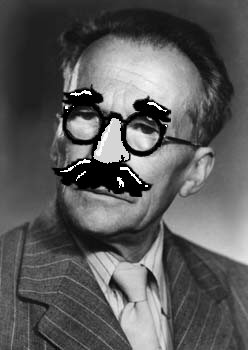Erwin Schrödinger
| Erwin Schrödinger | |
|---|---|
 | |
| Scientific classification | |
| Kingdom | Animalia |
| Phylum | Inhumanus |
| Class | Germanus |
| Order | Scientist |
| Family | Physicist |
| Genus | Quantum |
| Species | Geek |
| Conservation status | |
| 50% probability of extinction | |
“What a hell you've been doing with my cat? She looks half dead!”
– Mrs. Schrödinger on Erwin Schrödinger
Erwin Schrödinger (12 August 1887 – 4 January 1961[citation needed]) was an Austrian scientist, and superhero, who contributed greatly to the development of Quantum Economics. He is most famously known for a cat that can't make up it's damn mind.
Schrödinger's Cat[edit | edit source]
Erwin Schrödinger owned a large number of cats in his life, albeit not for very long. Where the life expectancy of a typical cat is somewhere near 16 to 20 years, Schrödinger's cats somehow seemed to have the lifespan of a couple of months to a maximum of a few years. The cats typically engaged with each other mentally.
When he stated that a cat in the box is both dead and alive if its fate depends on the quantum superposition of a decaying nucleus, the scientific community laughed out loud and proclaimed Schrödinger to be eccentric.
Most scientists, especially the mad variety, at the time were very fond of cats and were enraged about what Schrödinger proposed. Schrödinger's colleagues where so infuriated that the whole idea of it being a simple thought exercise simply didn't come through.
“Schrödinger, you fuck wad, you are seriously Bat Fuck Insane.”
– Albert Einstein on Schrödinger
Feeling that his purely hypothetical point didn't come across within the scientific community he set out to do what, in the first place,he didn't plan to do. He carried out his cat experiment.
In the presence of some of the greatest minds of his time Schrödinger put his cat, Fluffy, in a sealed box connected to a bottle of poison , a Geiger counter and a nucleus that was, or was not, going to decay.
The following transcript was written to cover the highly significant experiment.
- Schrödinger: Zee, Now I put ze cat in ze box...
- Fluffy: Meow!
- Schrödinger: ... and from zhiz moment on it is both dead und alive.
- Einstein: Schrödinger, You are seriously bat fuck insane.
- Bohr: Poor kitty! You are worse than those kitten huffers!
- Schrödinger: No no no, you do not understand, Ze cat izz in a quantum mechanical flux paradox. It is both dead und alive. u zee?
- Einstein: You are on crack. Niels, open that box and free that poor kitty.
- <box being opened>
- Fluffy: Meow!
- Bohr: Fluffy!!! She's alive! Thank God!!!
- Schrödinger: Of course you have opened ze box. Ze cat was in a zuperposition of two quantum zhtates before, you zee...
- Einstein: You fucktard. If that nucleus had decayed and triggered the gas, Fluffy would be a total goner by now.
- Schrödinger: No no no no no. You do not understand. The nucleus didn't und did decay at all before you opened ze box. zee?
- Bohr: Albert, let's go and leave this sadist kitten-torturing bastard to his business. He is nutzoid.
- Eugene Wigner: <enters> Sorry I'm late... have I missed anything?
- Eugene Wigner's friend: Nope.
Frustrated by the unexpected reaction from his fellow colleagues, Schrödinger continued to search for better ways to demonstrate his principle idea, the superposition paradox thingy.
Schrödinger was later arrested charged with cruelty to animals.
At his trial later that year he stated that the only reason the fatality rate of kittens in his experiment was a 100% was caused by unnecessary interference from the experiments other witnesses (like Niels Bohr).
Or, as he put it, Curiosity killed the cat(s).
Schrödinger's Kettle[edit | edit source]
Schrödinger began his scientific career from a young age, and quickly became noted for his approaches to scientific problems. One of his teachers was once quoted, "He seems to take multiple approaches to problems, all at the same time!" This was a good sign for things to come.
A child prodigy, Schrödinger penned his first scientific law, Schrödinger's Kettle, at the age of 10. It simply states: "A watched kettle never boils"
Indeed, he was right. A watched kettle never boils. However, Einstein later proved that the water inside does.
Quantum Economics[edit | edit source]
Erwin Schrödinger was a contributor to Quantum Economics for several reasons. He was once quoted: "Anything and everything that happens in the economy is magic." This statement is the bedrock upon which Quantum Economics was founded.
Schrödinger's Cut[edit | edit source]
Schrödinger’s Cut was a thought experiment proposed by Erwin Schrödinger. Consider a cubicle in which there is no method for an employer to observe the employee contained therein (a so called black box cubicle). An employee is then placed in such a cubicle with access to a corporation’s assets. While the actions of the employee are unmonitored, Schrödinger proposed that the employee existed both in a state of having embezzled and a state of honest work. Only by way of a painful audit can the wavefunction of the employee’s innocence collapse to a single classical economic state (a process called a cut collapse).
The Schrödinger Equation[edit | edit source]
The Schrödinger Equation was perhaps Schrödinger's greatest contribution to Quantum Economics. Formulaicly, it states:
Or, simplified:
Mathematicians have been baffled by this confounding identity, but no one can deny that this enigma has made math much more understandable.


